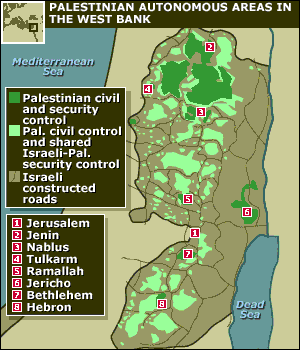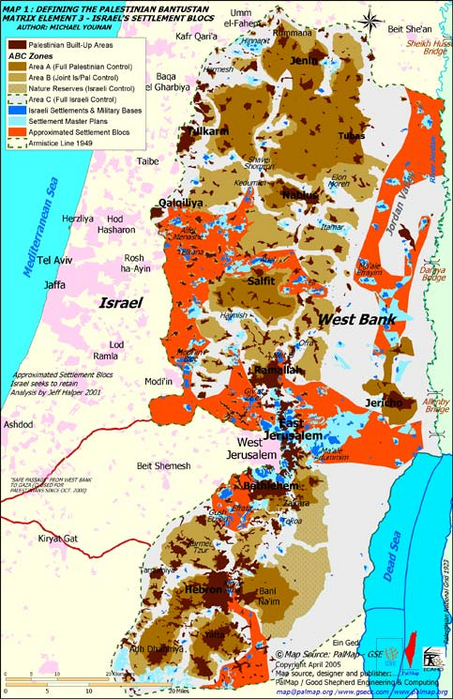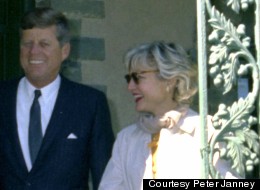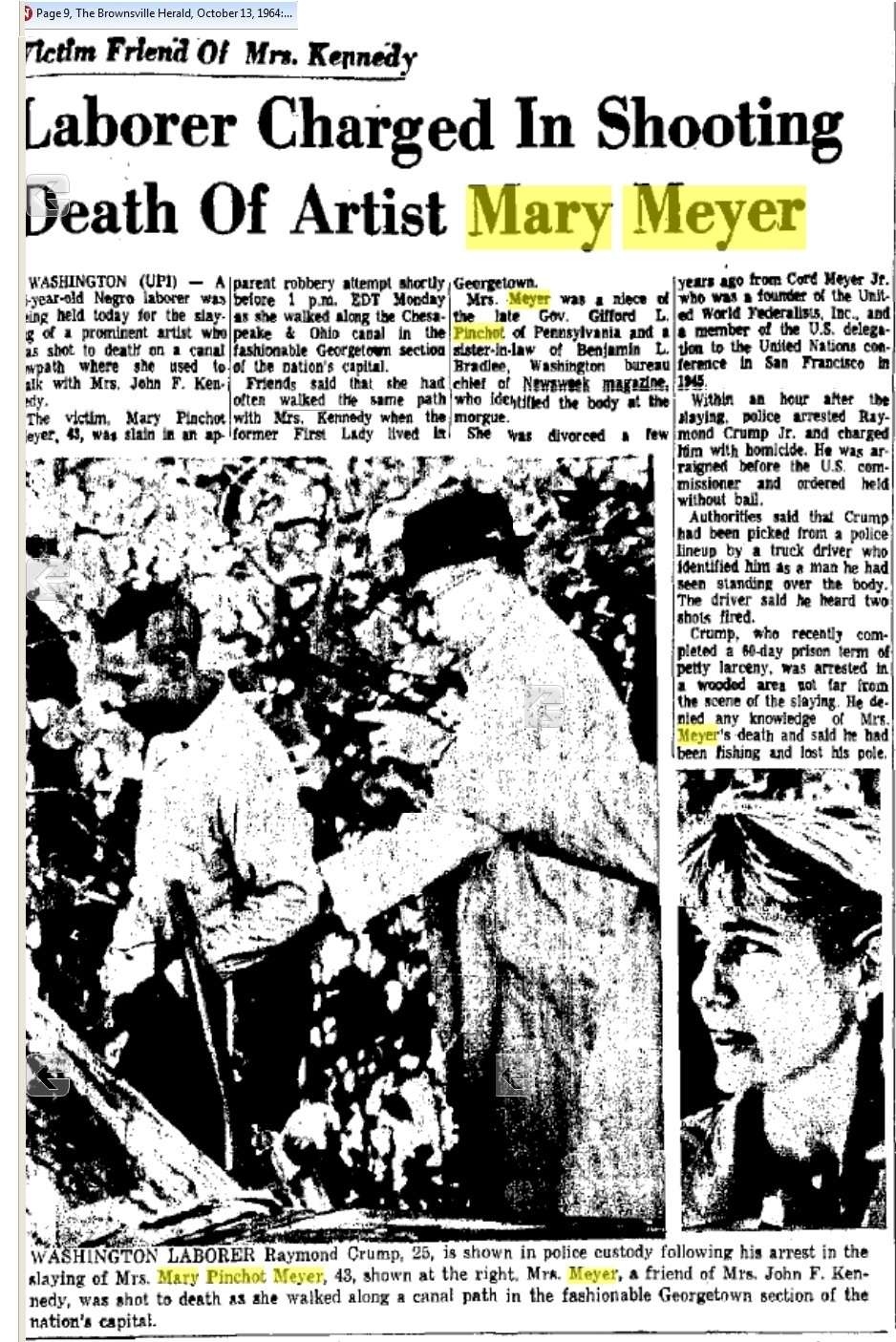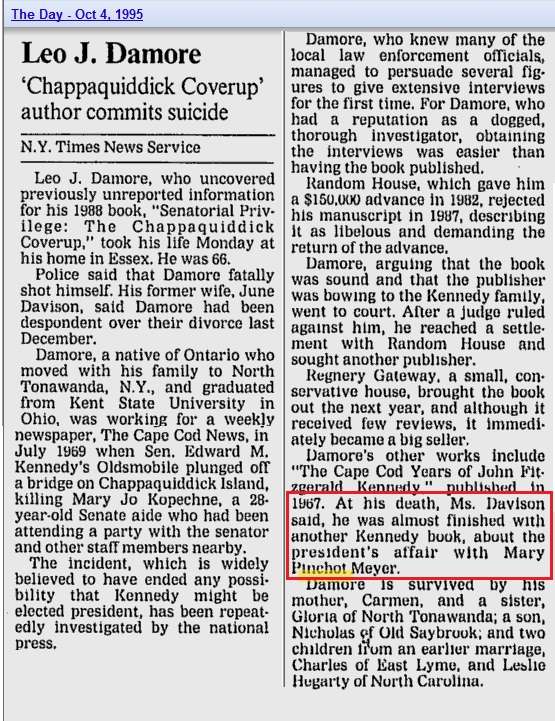Friends,
If you have Pop Corn Flicks on your TV there is a movie entitled “American
Affair” I did not realize it but it concerns Mary Pinchot Meyer, her CIA
husband, her CIA contacts and her neighbors. I do not know if "American Affair" is on NetFlix.
Those of us who question President John F. Kennedy's
assassination in 1963 have, over the years, become obsessed with another
murder. On Oct. 12, 1964, socialite and artist Mary Pinchot Meyer, a longtime
Kennedy mistress, was shot execution-style in broad daylight while walking along
the Georgetown canal towpath.
Within hours, police charged day laborer Ray Crump Jr. with murder. They never
found the gun, however, and a jury acquitted Crump after an eyewitness
described the killer as much bigger than the diminutive defendant. In the
ensuing years, the case has become one of Washington's most infamous unresolved
murder cases.
In his book, "Mary's Mosaic: The CIA Conspiracy to Murder
John F. Kennedy, Mary Pinchot Meyer, and Their Vision of World Peace," author Peter Janney lays
out a complex web of high society and high crimes that implicates some of the
nation's most respected intelligence agents, journalists and government
officials in what Janney contends was a massive cover-up spanning three
decades. At the center is a shadowy, all-too-familiar villain, the CIA of the
early-1960s.
Meyer was born into a wealthy
Pennsylvania family in 1920, and first met Kennedy at a prep school dance in
1938. Meyer attended
Vassar College and married CIA agent Cord Meyer in 1944. By the
mid-1950s, the couple was firmly established as part of Georgetown's glittering
young social set, whose members included then-Sen. Kennedy and his wife,
Jackie; Washington Post publisher Phil Graham and
his wife, Katherine; and journalist Joseph Alsop. The Meyers divorced in 1958, when
Mary was 38.
After Kennedy's election as president, Meyer became a frequent
visitor to the White House, and her sexual relationship with the president was
well known at the time, according to Janney and previous accounts, notably a
1998 biography of Meyer by journalist Nina Burleigh titled "A Very Private
Woman: The Life and Unsolved Murder of Presidential Mistress Mary Meyer."

Less well known was Meyer's friendship with then-Harvard professor and LSD guru Timothy
Leary, whom she visited several times at his office in Cambridge, Mass.
Janney's book contains the most exhaustive account to date of Meyer's
communication with Leary, who died in 1996. Much of Janney's account is based
on interviews Leary gave to another Kennedy conspiracy enthusiast, the
investigative journalist and author Leo Damore. Damore had been doing research for a book about
Meyer before he committed
suicide in 1995 (I wonder if it was really a suicide). In 2004, Janney
purchased Damore's notes and audio recordings on the Meyer case from his
estate.
 |
| Leo Damore |
Janney's principal thesis is that Meyer and Kennedy were deeply
in love and experimented with drugs together. Partly as a result of his
relationship with Meyer, an avowed pacifist, Kennedy began to question the
American military buildup that characterized the Cold War, according to Janney.
Like others before him, Janney posits that Kennedy's
assassination was the result of a CIA plot to eliminate the only man in the way
of the agency's total control over U.S. foreign policy. Those same forces,
Janney argues, viewed Meyer, an intimate confidante of the late president, as a
similar threat.
"Understandably preoccupied with Jack’s assassination, she
maintained a collection of 'clippings of the JFK assassination' in the bookcase
in her bedroom, next to the place where she kept her diary," Janney writes.
"The lingering question was how far Mary had gone in her investigation,
and what impact it might have had."
Janney's theory is that
an Army lieutenant and suspected CIA hit man named William Mitchell shot Meyer. The author says this hypothesis is strengthened by the fact
that neither the U.S. military nor Georgetown University, where Mitchell said
he was a professor, have any record of him. Damore claimed to have spoken on
the phone with Mitchell in 1993, and told his lawyer that Mitchell confessed to
him that Meyer's murder was "standard CIA procedure."
It's unclear why Damore didn't come forward with this revelation
before taking his own life. Perhaps he was saving it to use in his
never-published book. Mitchell
has never been located.
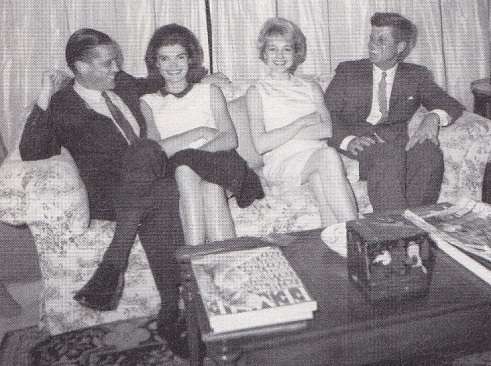 |
| Mary Meyer with the Kennedys |
Also missing from the history books is a diary that Meyer is said to
have kept, which her brother-in-law at the time, Washington Post editor Ben Bradlee, sought to
retrieve sometime in the 24 hours after her death. Bradlee said the diary
contained mostly sketches, but Janney said he believes it held a detailed
account of her affair with Kennedy, and may have revealed who might have wanted
her killed.
There are conflicting accounts of what happened to the diary. Meyer's sister, Tony Bradlee,
said she burned it. (In the movie a CIA operative burns the diary in a fire
place shortly before Mary’s death.) Damore claimed to have located a copy.
There are questionable secondhand accounts claiming it was turned over to CIA spymaster James
Angleton.
Janney suggests that
Bradlee helped cover up his sister-in-law's murder in order to advance his
career, writing that Bradlee "played fast and loose with the
facts" surrounding Meyer's death.
Henry Mankow wrote that Mary Pinchot
Meyer, the woman who inspired JFK to resist the government’s satanic power was
also brutally murdered by the CIA. Their deaths were part of a continuing
program of CIA political
assassinations.
Mankow added that "Mary's
Mosaic" a book was written by Peter Janney.
it is a memorial to Mary Pinchot Meyer (1920-1964), JFK's confidante,
adviser and lover.
 |
| Cord Meyer |
Mary Eno Pinchot
Meyer (October 14, 1920 – October 12, 1964) was an
American socialite, painter, former wife of CIA official Cord Meyer and mistress of United States president John F. Kennedy,
who was often noted for her desirable physique and social skills.Meyer's
murder, two days before her 44th birthday, in the Georgetown neighborhood of Washington, D.C.,
during the fall of 1964 would later stir speculation relating to Kennedy's
presidency and assassination. In
her 1998 biography, Nina Burleigh wrote, "Mary Meyer was an enigmatic woman in life, and
in death her real personality lurks just out of view."
Janney was a boyhood friend of Meyer's second son, Michael, who died when he was hit by a car in Dec. 1956. Janney recalls
how Mary, despite her own grief, comforted him and the motorist who was
hysterical. In Janney's memory, his friend's mother represented the ideal of
womanhood.
Janney's mother and Meyer were classmates at Vassar College. His
father, Wistar Janney and Mary's husband Cord Meyer, whom she divorced in 1957,
were both top officials at the CIA.
Janney believes CIA Chief of
Counterintelligence James Angleton (left) ordered the hit (because she
threatened to expose the CIA) Janney's own father and her ex-husband were both
privy to the decision.
MURDER INCORPORATED
Despite the injunction against CIA involvement in domestic politics, the book
reveals that the JFK assassination was only the most prominent of hundreds of
US political assassinations. Consider names like RFK, MLK, JFK Jr., Vincent
Foster and Senator Paul Wellstone. J. Edgar Hoover was probably murdered. Two
earlier Mary Meyer murder researchers, Leo Damore, James Forrestal and John
Davis, also died under suspicious circumstances. The CIA has many
discreet ways of making murder look natural. Janney quotes William Corson, a
CIA insider, ¨Murders are easy, suicides more difficult."
Another Janey source is Toni
Shimon, daughter of "police inspector" Joseph Shimon, liaison between
CIA, FBI, DC police and the Executive Branch from the 1940's-1980´s. He told
her political assassinations are part of doing business in Washington. He
carried out a few himself.

Janney also suspects that Philip Graham was murdered by the CIA who then controlled the Washington Post through his wife Publisher Kathleen
Graham and Managing Editor Ben Bradlee. This casts into doubt the Post's role in the Watergate Affair. Janney
says the 18-minutes missing from the Nixon tapes included his threat to expose
the CIA role in the JFK Assassination.
Mary Pinchot Meyer is often described disparagingly as Kennedy´s
"mistress." In fact, by 1963 she was part of his inner circle
and perhaps his greatest influence. An American bluebood, her father was a
two-term governor of Pennsylvania. She was raised in NYC and travelled in the
same social circles as JFK. A statuesque beauty, she was high-minded and had no
time for the young Kennedy who was a philanderer like his father.
Coming of age during World War Two, she was preoccupied with world peace. She
married Cord Meyer, an ex-Marine. She shared his commitment to the UN as a step
toward "world federalism." These young idealists didn't understand
the true agenda behind world government.
Mary found herself the wife of a rising star in the CIA. She socialized with
CIA families but was not afraid to voice her disapproval of CIA programs. After
her divorce, she became an artist and experimented with LSD.
Like Aldous Huxley and
Timothy Leary, who she visited, she believed that psychedelics were
necessary for people to break the shell of socialization and experience divine
consciousness. She started a group of Washington women dedicated to turning on
the powerful men in their lives in order to prevent war.
In 1959, Meyer became reacquainted with Kennedy whose marriage was a sham. Mary
turned JFK on to pot and LSD. Kennedy determined to make peace with Russia and
Cuba and wind down the Vietnam War. His Nuclear
Test Ban Treaty was passed in
the Senate. JFK’s emissary was meeting with Castro on the day of his
assassination.
Needless to say, LBJ reversed all
of JFK's initiatives. As a direct result, about 1.5 million
Vietnamese died. About 60,000 US soldiers died and $700 billion (in today's
dollars) were wasted in a war which discredited, divided and demoralized
the country.
Mary was privy to the power
struggle JFK had waged with the CIA and military industrial complex. Recklessly
she voiced her suspicions of Angleton. She had enough credibility and
connections to cause him serious problems.
Her murder Oct. 12 1964, two days shy of her 44th birthday, while walking on a
canal tow path, was as carefully orchestrated by the CIA as the President's
murder. (I know the tow path in Washingon D.C. very well. I had a regular habit of riding my bicycle on the C&O Canal tow path regularly.) Mary struggled with her assailant and called out for help but was
silenced by bullets to the head and heart.
Janney's 550-page book is 25-year
labor of love, meticulously researched and measured. Often the author is quite
lyrical, giving it a novelistic page-turner quality.
However, Janney does not understand that the CIA ultimately answers to the world banksters. He refers to an "invisible
government" but this is the Illuminati world government. He says James
Angleton was a mole but whose mole? The Mossad controlled him for the Illuminati bankers. They weren't going to let
an idealistic President impede their agenda which depends on constant war and
ever-increasing debt.
The mass media's complicity in the JFK coverup makes possible new “false flags”
almost monthly, hoaxes like Sandy Hook and Boston Marathon.
To be successful today, you have to collaborate with the satanic forces
destroying America, or at least not challenge them. However, I doubt if
ultimately the ruling class will enjoy the spoils of treason.
No matter how depressing, the Truth is always inspiring and so are people like
Janney who risk their lives to tell it.




